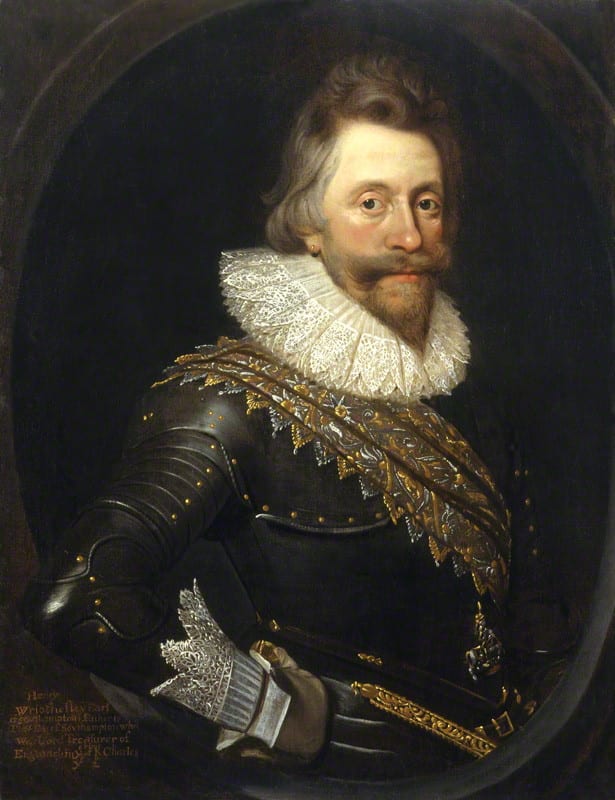Henry Wriothesley, 3rd Earl of Southampton, was an English nobleman who would probably have been forgotten had it not been for one distinction – the fact he was Shakespeare’s patron.
Two of Shakespeare’s long poems were dedicated to Henry Wriothesley, who became a patron of Shakespeare, and some scholars also believe that he is the ‘fair youth’ of Shakespeare’s sonnets. Students in classrooms around the world are not given much information about the 3rd Earl of Southampton apart from these snippets – and his presence in our consciousness is confined to his association with Shakespeare.
It’s hard to imagine, but while he was acting and writing plays one of Shakespeare’s ambitions was to be a poet. The man who became the greatest poet of Western culture, and most likely of all time, was an aspiring poet and thought about himself in that way. Writing plays was a trade, and hence the description ‘playwright,’ which put play writers on the same level as wheelwrights – the artisans who made wheels. But the description ‘poet,’ on the other hand, had some respectability.

Henry Wriothesley, 3rd Earl of Southampton & Shakespeare’s patron
Although Shakespeare was making money in the theatre, being paid for his acting and play writing, in order to be recognised as a poet he had to obtain some attention from an aristocrat. It was common for poets to dedicate poems to a nobleman, and as Southampton was receptive to the attention of poets and patronised several, Shakespeare chose him as his patron.
Shakespeare dedicated his narrative poem Venus and Adonis to the Earl in 1593, and then, in 1594 he dedicated The Rape of Lucrece to him in very extravagant terms: ‘The love I dedicate to your lordship is without end … What I have done is yours; what I have to do is yours; being part in all I have, devoted yours.’
Southampton was an attractive and colourful character. He was a man of action and always ready to go out on campaigns for the queen, Elizabeth I. He fell out of favour however, and was sentenced to death. His friends petitioned on his behalf and his sentence was commuted to life imprisonment. After Elizabeth’s death King James reinstated him as a courtier. He was very much in favour with the king and he served him faithfully and fought a number of battles in his name. James rewarded him with several honours.
Southampton was also an accomplished businessman and became actively involved in enterprises in the new world, notably the Virginia Company, of which he was a leading director.
He continued as a patron of the arts – as well as Shakespeare’s patron – throughout his life and remained an enthusiastic theatre-goer until the end, which came in 1624 when he died of a fever at the age of 51.




Excellent synopsis of the Earl’s life and possible connection with Shakespeare.
OMG i’m so excited. I have just found through ancestry that William Wriothesley was one of my great grandparents. I will watch the film recommended to find out more information x
Have just watched the new film ‘All is True’ which suggests that Shakespeare and the Earl of Southampton were lovers. Not sure where the evidence is for this. The film is great but there are many, possibly imagined, revelations about Shakespeare ‘s life. Visually stunning and superbly acted but I think it is largely speculation.
The “evidence” is likely the language of many sonnets which were dedicated to Southampton. Shakespeare uses references to “love” often in many sonnets. Today we read “love” as suggesting romance or sex. In Shakespeare’s time it meant a high level of respect and did not connote the sexual meaning of today.
It’s really the tone, not just the occasional flippant mention of love. See sonnets 20, 52, 71, and 95. This essay, if you can even call it that, mentions a very watered down and, frankly, the most utterly boring version of Wriothesley’s life ever to be put to pen, and Charlotte Stopes exists. If the entire sequence consisted of, say, sonnets 1-17, then I might give you some credit, but you sound like Charlton Ogburn on a bad day, and that’s hardly a compliment.
99.9% of Shakespeare’s biography is speculation. For The Earl of Southampton not to have mentioned Shakespeare at all, not once, is surprising.
The photography is stunning…I felt like I was breathing Tudor air…and I celebrate the return of Kenneth Baranagh to the big screen…I just watched the film twice and can’t wait to see it again. As an American unfamiliar with Shakespeare I think that this version has as much chance at being true as any other and it would seem that much of his life wasn’t documented so it’s anybody’s guess…I can’t imagine Kenneth going there if he didn’t think this was a real possibility…well done!
is this man connected to “call call me” in H. Mantells recent trilogy?
Hi, I am doing academic research into the link between Shakespeare and The Earl of Southampton. While reading your article I noticed a peculiar line….you wrote: ‘the fact he was Shakespeare’s patron’. Where is the source material for this fact? As far as I, and other researchers are aware, there is no evidence of any financial link between the Bard and the Earl.
Thank you for your time.
Anna
Well, at the time, the Bard was only known as a dramatist and a playwright. So, choosing the Earl to be his patron could only mean an act of gaining recognition as a poet.
Where is it written that The Earl patronised Shakespeare ?